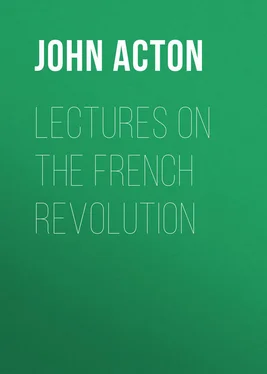John Acton - Lectures on the French Revolution
Здесь есть возможность читать онлайн «John Acton - Lectures on the French Revolution» — ознакомительный отрывок электронной книги совершенно бесплатно, а после прочтения отрывка купить полную версию. В некоторых случаях можно слушать аудио, скачать через торрент в формате fb2 и присутствует краткое содержание. Жанр: foreign_antique, foreign_prose, Историческая проза, на английском языке. Описание произведения, (предисловие) а так же отзывы посетителей доступны на портале библиотеки ЛибКат.
- Название:Lectures on the French Revolution
- Автор:
- Жанр:
- Год:неизвестен
- ISBN:нет данных
- Рейтинг книги:4 / 5. Голосов: 1
-
Избранное:Добавить в избранное
- Отзывы:
-
Ваша оценка:
- 80
- 1
- 2
- 3
- 4
- 5
Lectures on the French Revolution: краткое содержание, описание и аннотация
Предлагаем к чтению аннотацию, описание, краткое содержание или предисловие (зависит от того, что написал сам автор книги «Lectures on the French Revolution»). Если вы не нашли необходимую информацию о книге — напишите в комментариях, мы постараемся отыскать её.
Lectures on the French Revolution — читать онлайн ознакомительный отрывок
Ниже представлен текст книги, разбитый по страницам. Система сохранения места последней прочитанной страницы, позволяет с удобством читать онлайн бесплатно книгу «Lectures on the French Revolution», без необходимости каждый раз заново искать на чём Вы остановились. Поставьте закладку, и сможете в любой момент перейти на страницу, на которой закончили чтение.
Интервал:
Закладка:
Meanwhile the National Assembly, aware of the strength of popular feeling around them, were calm in the midst of danger. Theirs was a diminished part, while, almost within sight and hearing, history was being unmade and made by a power superior to their own. On the morning of the 14th they elected the Committee of Eight who were to draw up the Constitution. Mounier and the friends of the English model still prevailed. By evening their chance had vanished, for the English model includes a king.
Late in the day Noailles brought authentic news of what he had witnessed; and the Assembly learned, in agitated silence, that the head of the governor of the impregnable Bastille had been displayed on a pike about the streets of Paris. Lafayette took the chair, while the President hurried with Noailles to the palace. They made no impression there. Lewis informed them that he had recalled his troops, and then he went to bed, tranquil, and persistently ignoring what it was that had been done, and what it was that had passed away.
But in the morning, when the Assembly met in disorder, and were about to send one more deputation, it was found that a change had taken place in the brief hours of that memorable night. At two o'clock the king was roused from sleep by one of the great officers of the household. The intruder, La Rochefoucauld, Duke de Liancourt, was not a man of talent, but he was universally known as the most benevolent and the most beneficent of the titled nobles of the realm. He made his master understand the truth and its significance, and how, in the capital that day, in every province on the morrow, the authority of government was at an end. And when Lewis, gradually awaking, exclaimed, "But this is a great revolt!" Liancourt replied, "No, sir, it is a great Revolution!" With those historic words the faithful courtier detached the monarch from his ministers, and obtained control over him in the deciding days that were to follow. Guided by the duke, and attended by his brothers, but without the ceremonious glories of regality, Lewis XVI. went down to the Assembly and made his submission. In the pathetic solemnity of the scene, the deputies forgot for a moment their righteous anger and their more righteous scorn, and the king returned to the palace on foot, in a sudden procession of triumph, amnestied and escorted by the entire body.
The struggle was over, and the spell was broken; and the Assembly had to govern France. To establish order a vast deputation repaired to the Hôtel de Ville, where Lally Tollendal delivered an oration thrilling with brotherhood and gladness, and appeared, crowned with flowers, before the people.
To cement the compact between Paris and Versailles, Bailly, the first president, was placed at the head of the new elective municipality, and the vice-president, Lafayette, became commander of the National Guard. This was the first step towards that Commune which was to exercise so vast an influence over the fortunes of France. It came into existence of necessity, when the action of Government was paralysed, and the space which it occupied was untenanted.
The National Guard was an invention of great import, for it was the army of society distinct from the army of the state, opinion in arms apart from authority. It was the middle class organised as a force, against the force above and the force below; and it protected liberty against the Crown, and property against the poor. It has been ever since the defence of order and the ruin of governments; for, as it was the nation itself, nobody was bold enough to fight it. Before the altar of Notre Dame Lafayette took the oath of fidelity to the people, and not to the king. He never displayed real capacity for peace or war; but in the changes of a long life he was true to the early convictions imbibed in Washington's camp.
On their return from Paris the great deputation reported that the people demanded the recall of Necker. At last the king dismissed Breteuil, and charged the Assembly to take charge of a letter to the banished statesman. His banishment had lasted five days; it was now the turn of his enemies. On the same night, July 16, the baffled intriguers went into exile. Lewis himself sent his brother away, for the safety of himself and of the dynasty. The others followed. The queen was compelled to dismiss Madame de Polignac, whom she had too confidently trusted, and she was left alone amongst her enemies. This was the first emigration. The remaining nobles announced that they abandoned resistance, and the Assembly was at last united. The fight was lost and won, and the victor claimed the spoils.
But the Assembly was not the victor, and had contributed little to the portentous change between the dismissal of Necker and the despatch of the fleet messenger with his recall. Whilst the deputies served the national cause by talking, there were plainer men at Paris who had died for it. The force that risked life and conquered was not at Versailles. It was Paris that held the fallen power, the power of governing itself, the Assembly, and France. The predominance of the capital was the new feature that enabled the monarchy to pass into a Republic.
The king had become a servant of two masters. Having recanted before his master at Versailles, it became necessary that he should submit himself to the new and mysterious authority at the Hôtel de Ville. He had yielded to representative democracy. He had to pay the same recognition to direct democracy. It was not safe to leave the Orleans stronghold entirely in their hands. Between the ministry that was gone and the ministry to come, Lewis acted by the advice of Liancourt.
Early on July 17 he made his will, heard mass, received communion, and set out to visit his good city. The queen remained behind, with all her carriages ready, in order that, at the first signal, she might fly for her life. At the barrier the king's eye fell, for the first time, on innumerable armed men, who lined the streets for miles, and wore strange colours, and did not own him as their chief. Neither the National Guard, nor the dense crowd behind them, uttered a sound of welcome. Not a voice was raised, except for the nation and its deputies.
The peace made between the king and the Assembly did not count here. All men had to know that there was a distinct authority, to which a further homage was due, even from the sovereign. At the Hôtel de Ville the homage was paid. There the king confirmed the new mayor, and approved what had been done, and he showed himself to the people with the new cockade, devised by Lafayette, to proclaim that the royal power which had ruled France since the conversion of Clovis ruled France no more. He made his way home amid acclamations, regulated by the commander of the National Guard, like the gloomy and menacing silence in which he had been received.
Конец ознакомительного фрагмента.
Текст предоставлен ООО «ЛитРес».
Прочитайте эту книгу целиком, купив полную легальную версию на ЛитРес.
Безопасно оплатить книгу можно банковской картой Visa, MasterCard, Maestro, со счета мобильного телефона, с платежного терминала, в салоне МТС или Связной, через PayPal, WebMoney, Яндекс.Деньги, QIWI Кошелек, бонусными картами или другим удобным Вам способом.
Интервал:
Закладка:
Похожие книги на «Lectures on the French Revolution»
Представляем Вашему вниманию похожие книги на «Lectures on the French Revolution» списком для выбора. Мы отобрали схожую по названию и смыслу литературу в надежде предоставить читателям больше вариантов отыскать новые, интересные, ещё непрочитанные произведения.
Обсуждение, отзывы о книге «Lectures on the French Revolution» и просто собственные мнения читателей. Оставьте ваши комментарии, напишите, что Вы думаете о произведении, его смысле или главных героях. Укажите что конкретно понравилось, а что нет, и почему Вы так считаете.












